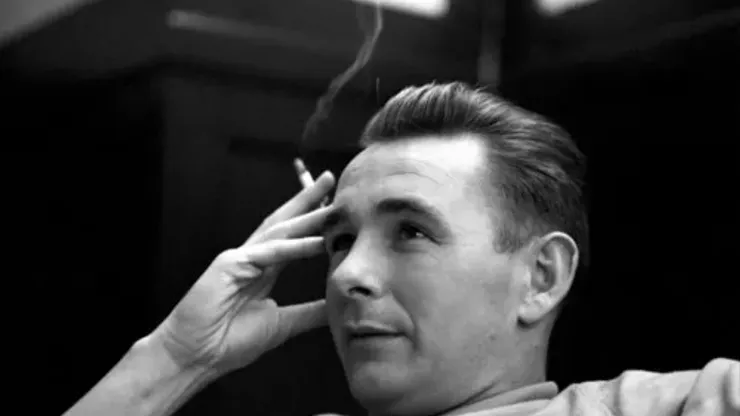Brian Clough’s managerial career has been well documented, but it often completely overshadows the success Clough had as a player. Whilst he was often accused of nepotism towards his son Nigel whilst he was the manager of Nottingham Forest, it wasn’t hard to see where the younger player got his footballing talent from. His father was a lethal striker with one of the best scoring rates of all time in league football.
Clough was born in Middlesbrough in March 1935 and was the sixth of nine children born to his parents, Sarah and Joseph. The eldest child, Elizabeth, died in 1927 but the family continued to nurture a loving home. As was typical of the time, Clough had his workaholic attitude instilled in to him at an early age. “Maybe it was the constant sight of Mam, with eight children to look after, working from morning till night, working harder than you or I have ever worked.”
Clough was a naturally bright student but neglected his studies in favour of football and cricket and left school in 1950 with no formal qualifications. On taking a job with local chemical giant ICI, Clough began to play non-league football with the delightfully named Billingham Synthonia.
What is it about the North Eastern non-league football scene? The North East has some of the best names for its clubs, including the wonderful Bedlington Terriers, as an owner of a Bedlington myself, it’s nice to have a club named after a breed of dog and the historic Blyth Spartans. Such wonderfully eccentric English club names always make me smile.
Clough played for Synthonia for 2 years until he reached 18 and he then went into the RAF to complete his national service. After the two year period was complete, Clough returned to the North East to join his home town club of Middlesbrough in 1955 and quickly became a hero to the Ayresome Park faithful.
Clough made his debut against Barnsley in September 1955 and managed to hit his first goal for the club one month later against Leicester City in front of the Middlesbrough faithful. It would be the beginning of a phenomenal run that saw Clough hit 204 goals in 222 games for his home town club, one of the best records in League Football history.
Between the 1956-57 season and the 1960-61 season, Clough finished Middlesbrough’s top scorer in 5 consecutive seasons.
1956-57 40 goals
1957-58 42 goals
1958-59 43 goals
1959-60 40 goals
1960-61 36 goals
As he hit goal after goal, he eventually received the England call up his form deserved but only had two opportunities to show what he had.He played in Internationals against Wales and Sweden in 1959, but didn’t find the net in neither match. He was never picked for England again. In the summer of 1961, Clough was surprisingly sold to Sunderland for £45,000 and the goals just kept coming for him.
He hit an amazing 54 goals in 61 appearances when disaster struck. Playing against Bury on Boxing Day 1962, Clough was involved in a collision with their goalkeeper Chris Harker and was stretchered off the pitch in agony. It was discovered he had ruptured his cruciate ligament, a dreadful blow even in this day and age.
Despite the severity of his injury, Clough tried to make a comeback after two years of rehabilitation, but it was no good. 3 games in to his comeback, he retired from playing aged just 29. Sunderland were kind enough to offer him a position on the coaching staff and he stayed at the club until the following year when in October 1965 he was offered the managers job at Hartlepools.
Clough took the position, becoming the youngest manager in the league at just 30 and a whole new chapter was about to written in the life of Brian.He passed away aged 69 in September 2004, after a long battle with stomach cancer and I doubt we’ll ever see the like, either as player or a manager again.
- Middlesbrough’s top scorer 5 seasons in a row, with 201 goals
- Hit 40 or more goals in 4 seasons
- Scored a total of 254 goals in 281 appearances for Sunderland and Middlesbrough
Len Shackleton : “He was the greatest centre-forward I ever saw. Clough scored goals more consistently than anybody else did and that’s a centre-forward’s job. He would have shattered the record of Dixie Dean had he played against similar style defences.’
200+ Channels With Sports & News
- Starting price: $33/mo. for fubo Latino Package
- Watch Premier League, Women’s World Cup, Euro 2024 & Gold Cup
The New Home of MLS
- Price: $14.99/mo. for MLS Season Pass
- Watch every MLS game including playoffs & Leagues Cup
Many Sports & ESPN Originals
- Price: $10.99/mo. (or get ESPN+, Hulu & Disney+ for $14.99/mo.)
- Features Bundesliga, LaLiga, Championship, & FA Cup
2,000+ soccer games per year
- Price: $5.99/mo
- Features Champions League, Serie A, Europa League & Brasileirāo
175 Premier League Games & PL TV
- Starting price: $5.99/mo. for Peacock Premium
- Watch 175 exclusive EPL games per season






